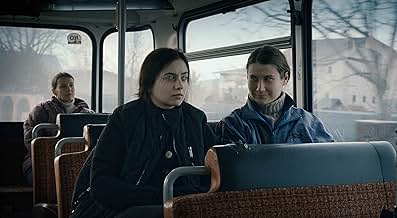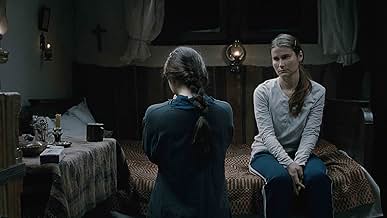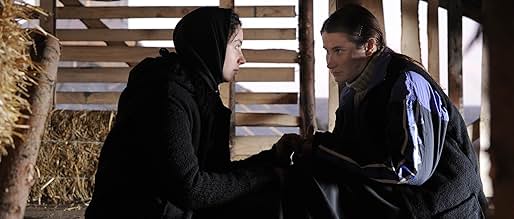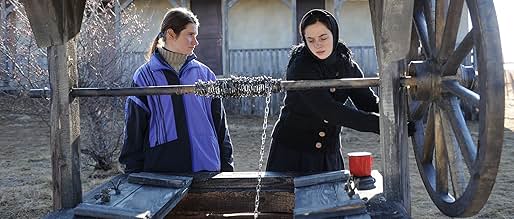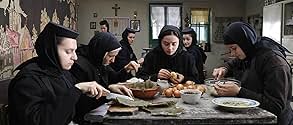The friendship between two young women who grew up in the same orphanage; one has found refuge at a convent in Romania and refuses to leave with her friend, who now lives in Germany.The friendship between two young women who grew up in the same orphanage; one has found refuge at a convent in Romania and refuses to leave with her friend, who now lives in Germany.The friendship between two young women who grew up in the same orphanage; one has found refuge at a convent in Romania and refuses to leave with her friend, who now lives in Germany.
- Director
- Writers
- Stars
- Awards
- 8 wins & 19 nominations total
Valeriu Andriuta
- Priest
- (as Valeriu Andriutã)
- Director
- Writers
- All cast & crew
- Production, box office & more at IMDbPro
Featured reviews
A KVIFF viewing of Romanian auteur Cristian Mugiu's latest gripping modern exorcism tale which has garnered two wins in Cannes this year, a BEST SCREENPLAY award and the young pair Cosmina Stratan and Cristina Flutur shared Best Actress honor, which staunchly vindicates Cristian's consistent excellence not only in his fine-tempo and well-pitched directing bent, but a robust script and ultra-overpowering cast as a whole superlative pack.
Like his breakthrough chef-d'oeuvre 4 MONTHS, 3 WEEKS AND 2 DAYS (2009, a 9/10), the film anew grapples with the contentious subject-matters (this time it is about religious belief) and assigns two young girls in the main roles. The film acquaints its viewers with a secluded locale, an austere monastery (with no electricity and utilizing well water for example) is in stark contrast to the contemporary modernity, then slowly unwinds a tug-of-war in the name of love between God and human, a hapless destiny falls upon 2 girls from the same orphanage, one has become a pious nun so far, yet another is an obstinate non-believer, who chooses God as her love competitor and defies any compromise.
There is an unremitting impulse of captivation throughout the entire film which successfully banishes the awareness of its 150-minutes length. One of Mungiu's trump card is his virtuoso camera deployment, which has again fixated on a well-organized angle, especially in the indoor scenes, all the inconsequential items have been placed into incessant expositions of still paintings.
A strong-arm tension has been outstandingly established among three main characters (the said two girls plus the priest), although a few well-worn plot twists-and-turns may not survive the hindsight, however the eventual repercussion is nothing if not astonishing.
Much accolades should be granted to the film about its no shade of grey amplification of managing the thorny issue, the clear-minded of eschewing any grandiosity with a telling coda, which can never be less appreciated among cinephiles.
Like his breakthrough chef-d'oeuvre 4 MONTHS, 3 WEEKS AND 2 DAYS (2009, a 9/10), the film anew grapples with the contentious subject-matters (this time it is about religious belief) and assigns two young girls in the main roles. The film acquaints its viewers with a secluded locale, an austere monastery (with no electricity and utilizing well water for example) is in stark contrast to the contemporary modernity, then slowly unwinds a tug-of-war in the name of love between God and human, a hapless destiny falls upon 2 girls from the same orphanage, one has become a pious nun so far, yet another is an obstinate non-believer, who chooses God as her love competitor and defies any compromise.
There is an unremitting impulse of captivation throughout the entire film which successfully banishes the awareness of its 150-minutes length. One of Mungiu's trump card is his virtuoso camera deployment, which has again fixated on a well-organized angle, especially in the indoor scenes, all the inconsequential items have been placed into incessant expositions of still paintings.
A strong-arm tension has been outstandingly established among three main characters (the said two girls plus the priest), although a few well-worn plot twists-and-turns may not survive the hindsight, however the eventual repercussion is nothing if not astonishing.
Much accolades should be granted to the film about its no shade of grey amplification of managing the thorny issue, the clear-minded of eschewing any grandiosity with a telling coda, which can never be less appreciated among cinephiles.
It is a sad story told in a fair way. You see the two characters desperately trying to save each other, but also desperately trying to keep themselves into the "safe bubble" they created around them: Voichita's bubble is the monastery, Alina's bubble is Voichita, the only human being that ever loved her.
It is the story of two girls who grew up in an orphanage (I felt a shiver trying to imagine it) and had few choices at the moment they became adults. The movie lefts many questions open. One of them, the hardest perhaps, is how was it possible that nobody (monastery, hospital, school, foster family, police, etc.) was able to help a girl, while everybody agreed on the fact that she needed help.
It is the story of two girls who grew up in an orphanage (I felt a shiver trying to imagine it) and had few choices at the moment they became adults. The movie lefts many questions open. One of them, the hardest perhaps, is how was it possible that nobody (monastery, hospital, school, foster family, police, etc.) was able to help a girl, while everybody agreed on the fact that she needed help.
'Based on a true story' – a phrase that can cover so many bases - is the slow-burning and languorous Romanian film Beyond the Hills.
Set predominantly in a monastery in a bleak and poverty-stricken district, it is a complex and multi-layered film revolving around two young women, Alina and Voichita. Previously childhood friends then lovers, their lives intertwine once more when Alina returns from working in Germany in an attempt to once more enter into a relationship with Voichita who has since taken Holy Orders and is living the chaste and extremely frugal life of a nun. The rekindling of the relationship was always doomed and as Alina's mental health deteriorates with the realisation that she will not achieve her objective, she provokes a series of events culminating in the belief by some that she is possessed and needs cleansing.
A Romanian film about faith, despair and unrequited lesbian love in an impoverished monastery was never likely to be an action-packed, sensationalist blockbuster. It is long at 155 minutes and its pace tends to alternate between dead slow and stop. It's the sort of a film which will take over 5 minutes to show a nun leaving the kitchen to draw water from the well and return to the kitchen with no dialogue or plot advancement throughout that period. But it is a film that has the courage to take its time, confident that it can draw you into the lives of the people whose story it tells. And on the whole it succeeds.
There are no real villains or heroes in the film. It does not take the easy route to mock and blame religion for out-dated belief – when a nun believes she has been sent a sign from God and goes all peculiar, the Orthodox Priest in charge cuts down the hysteria curtly and tells her and the other nuns to move on. No, the people shown in this film, be they doctors, police or those of the cloth, are portrayed as well-meaning individuals all looking to do no harm even if, like all of us, they can be judgmental and self-righteous on occasion. Beyond the Hills is an unashamedly bleak and ultimately very sad film which gives no answers but merely records events leaving its audience to draw their own conclusions.
Cinematography was good, though the constant sound of the ever-blowing wind was sometimes crude and off-putting.
And there was an early failure of the sub-titles. When Alina first arrives at the monastery, the camera concentrates on a hand-written sign at its entrance. It's clearly of some import for it to be shown so, but the audience is not let in on its message. Post-film research ascertained it stated, words to the effect: This is the House of God. Forbidden to those of different religion. You must believe and not doubt. It would have explained much.
Set predominantly in a monastery in a bleak and poverty-stricken district, it is a complex and multi-layered film revolving around two young women, Alina and Voichita. Previously childhood friends then lovers, their lives intertwine once more when Alina returns from working in Germany in an attempt to once more enter into a relationship with Voichita who has since taken Holy Orders and is living the chaste and extremely frugal life of a nun. The rekindling of the relationship was always doomed and as Alina's mental health deteriorates with the realisation that she will not achieve her objective, she provokes a series of events culminating in the belief by some that she is possessed and needs cleansing.
A Romanian film about faith, despair and unrequited lesbian love in an impoverished monastery was never likely to be an action-packed, sensationalist blockbuster. It is long at 155 minutes and its pace tends to alternate between dead slow and stop. It's the sort of a film which will take over 5 minutes to show a nun leaving the kitchen to draw water from the well and return to the kitchen with no dialogue or plot advancement throughout that period. But it is a film that has the courage to take its time, confident that it can draw you into the lives of the people whose story it tells. And on the whole it succeeds.
There are no real villains or heroes in the film. It does not take the easy route to mock and blame religion for out-dated belief – when a nun believes she has been sent a sign from God and goes all peculiar, the Orthodox Priest in charge cuts down the hysteria curtly and tells her and the other nuns to move on. No, the people shown in this film, be they doctors, police or those of the cloth, are portrayed as well-meaning individuals all looking to do no harm even if, like all of us, they can be judgmental and self-righteous on occasion. Beyond the Hills is an unashamedly bleak and ultimately very sad film which gives no answers but merely records events leaving its audience to draw their own conclusions.
Cinematography was good, though the constant sound of the ever-blowing wind was sometimes crude and off-putting.
And there was an early failure of the sub-titles. When Alina first arrives at the monastery, the camera concentrates on a hand-written sign at its entrance. It's clearly of some import for it to be shown so, but the audience is not let in on its message. Post-film research ascertained it stated, words to the effect: This is the House of God. Forbidden to those of different religion. You must believe and not doubt. It would have explained much.
Albert Camus said, "The evil that is in the world almost always comes of ignorance, and good intentions may do as much harm as malevolence if they lack understanding." These words become prophetic in Romanian director Cristian Mungui's Beyond the Hills, a powerful tale of religious and emotional obsession that leads to tragic consequences. Like his award winning abortion drama, 4 Months, 3 weeks and 2 Days, the Palme d'Or winner at Cannes in 2007, it is deliberately paced and can be demanding to the viewer unaccustomed to long takes without cuts or camera movements. Set in a remote Orthodox Christian convent in rural Moldova known as New Hill Monastery, Beyond the Hills is a social drama based on two books labeled "nonfiction novels" by Romanian journalist Tatiana Niculescu Bran concerning an exorcism in 2005 that became sensationalized in the press.
Filmed in -15 degree weather during the heaviest snow season in years, Oleg Mutu's cinematography makes us feel the bleakness and the cold, damp air inside a convent that has no electricity or running water. As the film begins, Alina (Cristina Flutur) has returned from Berlin to the town in which she grew up. She is met at the train station by Voichita (Cosmina Stratan), her best friend and partner since their years together in an orphanage. Voichita believes she has found her direction, however, in the convent where she is a novice and has become emotionally attached to the priest she calls "Papa" (Valeriu Andriuta) and the mother superior (Dana Tapalaga).
Alina, a sometimes believer, has come to rescue her friend from what she feels is the church's domination and is unprepared for Voichita's unwillingness to leave with her and work together on a German cruise ship. She tells Alina that she has found a sense of family and has been changed by her experience. Though she lovingly invites her friend to give herself to the Lord, Alina feels betrayed. A tug of war develops between the church's fear of the "unbeliever", and their wish to provide sanctuary, knowing that Alina has nowhere else to go. Under threat by those around her, Voichita finds herself torn between her one and only friend and her devotion to God.
Desperate for affection, Alina flirts with suicide and her growing paranoia makes her suspicious of everyone in Voichita's life. Soon, her repeated fits of hysteria land her in the local hospital, but the anti-psychotic drugs provide only a temporary solution. When the doctors tell the priest that there is nothing further they can do to help, Alina is returned to the convent but the situation does not improve. The distraught girl does leave on her own to go back to her last foster home, but gives up all her possessions and returns to the monastery, unable to stay away from Voichita.
Ultimately, the priest is convinced that she is not just a sinner, but one possessed by the devil and must undergo an exorcism. Without her consent, Alina is tied to a cross with ropes and chains and her mouth gagged to prevent her screaming as the service is performed. Beyond the Hills is an intense and haunting film, and the performances of Flutur and Stratan, who shared the Best Actress award at Cannes, add depth and complexity to the film's moral universe. Under Mungui's direction, the film avoids pointing the finger. There are no good guys and bad guys and everyone involved thinks they are acting in Alina's best interests, but they are sadly myopic.
Regardless of their good intentions, each character is so caught up in the narrow scope of their vision that they cannot see beyond their immediate self-interest. What becomes lost is the ability to look beyond rituals and forms to find the substance - love, charity, and compassion. According to Mungui, the film "speaks about guilt but is more concerned with love and choices, with the things people do in the name of their beliefs, the difficulty of telling good from bad, understanding religion literally, indifference as an even greater sin than intolerance and freedom of will." When these factors are present, tragedy cannot be far away.
Filmed in -15 degree weather during the heaviest snow season in years, Oleg Mutu's cinematography makes us feel the bleakness and the cold, damp air inside a convent that has no electricity or running water. As the film begins, Alina (Cristina Flutur) has returned from Berlin to the town in which she grew up. She is met at the train station by Voichita (Cosmina Stratan), her best friend and partner since their years together in an orphanage. Voichita believes she has found her direction, however, in the convent where she is a novice and has become emotionally attached to the priest she calls "Papa" (Valeriu Andriuta) and the mother superior (Dana Tapalaga).
Alina, a sometimes believer, has come to rescue her friend from what she feels is the church's domination and is unprepared for Voichita's unwillingness to leave with her and work together on a German cruise ship. She tells Alina that she has found a sense of family and has been changed by her experience. Though she lovingly invites her friend to give herself to the Lord, Alina feels betrayed. A tug of war develops between the church's fear of the "unbeliever", and their wish to provide sanctuary, knowing that Alina has nowhere else to go. Under threat by those around her, Voichita finds herself torn between her one and only friend and her devotion to God.
Desperate for affection, Alina flirts with suicide and her growing paranoia makes her suspicious of everyone in Voichita's life. Soon, her repeated fits of hysteria land her in the local hospital, but the anti-psychotic drugs provide only a temporary solution. When the doctors tell the priest that there is nothing further they can do to help, Alina is returned to the convent but the situation does not improve. The distraught girl does leave on her own to go back to her last foster home, but gives up all her possessions and returns to the monastery, unable to stay away from Voichita.
Ultimately, the priest is convinced that she is not just a sinner, but one possessed by the devil and must undergo an exorcism. Without her consent, Alina is tied to a cross with ropes and chains and her mouth gagged to prevent her screaming as the service is performed. Beyond the Hills is an intense and haunting film, and the performances of Flutur and Stratan, who shared the Best Actress award at Cannes, add depth and complexity to the film's moral universe. Under Mungui's direction, the film avoids pointing the finger. There are no good guys and bad guys and everyone involved thinks they are acting in Alina's best interests, but they are sadly myopic.
Regardless of their good intentions, each character is so caught up in the narrow scope of their vision that they cannot see beyond their immediate self-interest. What becomes lost is the ability to look beyond rituals and forms to find the substance - love, charity, and compassion. According to Mungui, the film "speaks about guilt but is more concerned with love and choices, with the things people do in the name of their beliefs, the difficulty of telling good from bad, understanding religion literally, indifference as an even greater sin than intolerance and freedom of will." When these factors are present, tragedy cannot be far away.
A complex story plot describing a tragic division of life paths of two female friends who found themselves either into grinding mill of bigotry in church structures or into that of a cold bureaucratic apparatus. This poetically told story leads us through meditative winter landscapes and dark interiors of the monastery where, besides obvious social issues, one can vaguely discern a disturbing relationship between the two friends consisting of perplexing resignation and self-destruction. The success of this work lies in the abundance of details which bring the audience into contemplation about human nature.
Did you know
- TriviaFilmed and edited simultaneously in chronological order.
- ConnectionsFeatured in At the Movies: Cannes Film Festival 2012 (2012)
- How long is Beyond the Hills?Powered by Alexa
Details
- Release date
- Countries of origin
- Official sites
- Language
- Also known as
- Tepelerin Ardında
- Filming locations
- Campina, Romania(location)
- Production companies
- See more company credits at IMDbPro
Box office
- Gross US & Canada
- $124,919
- Opening weekend US & Canada
- $14,622
- Mar 10, 2013
- Gross worldwide
- $673,493
- Runtime
- 2h 32m(152 min)
- Color
- Sound mix
- Aspect ratio
- 2.35 : 1
Contribute to this page
Suggest an edit or add missing content


